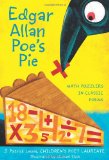
Math Puzzlers in Classic Poems
Review posted May 3, 2012.
Harcourt Children's Books, 2012. 37 pages.
I feel a tiny bit sheepish by how much fun I find in this book. J. Patrick Lewis, Children's Poet Laureate, has parodied 14 classic poems that children may well be familiar with and has inserted... a math problem.
These problems are not particularly tricky. Though I suppose that depends on the child's age. (There is some multiplication and division, so this is more for upper elementary grades.) At times it's not totally clear exactly what they want you to figure out (though that is given in the upside-down answers on the next page). But the parodies are definitely playful.
Could there possibly be a better way to get a kid to do word problems for fun and without fear?
The poems, after the title, list the poem they are inspired by.
Here's the end of "Edgar Allan Poe's Apple Pie," the one inspired by "The Raven":
I ignored the frightful stranger
Knocking, knocking . . . I, sleepwalking,
Pitter-pattered toward the pantry,
Took a knife from the kitchen drawer,
And screamed aloud, "How many cuts
Give me ten pieces?" through the door,
The stranger bellowed, "Never four!"
Another favorite for me is the one that plays off a poem I love, "Us Two," by A. A. Milne. Here's the beginning:
Wherever I am, there's always Boo.
Boo in the flowers with me.
The size of our garden is eight by two.
"How much wire for the fence," says Boo,
"If it wraps all around as it ought to do?
Let's guess together," says Boo to me.
"Let's guess together," says Boo.
With some, like "Robert Frost's Boxer Shorts," he goes for silly. "Langston Hughes's Train Trip" uses some trickier math. "Edward Lear's Elephant with Hot Dog" is just a limerick.
That should give you an idea of what's going on here. Some quite silly fun. With math!
